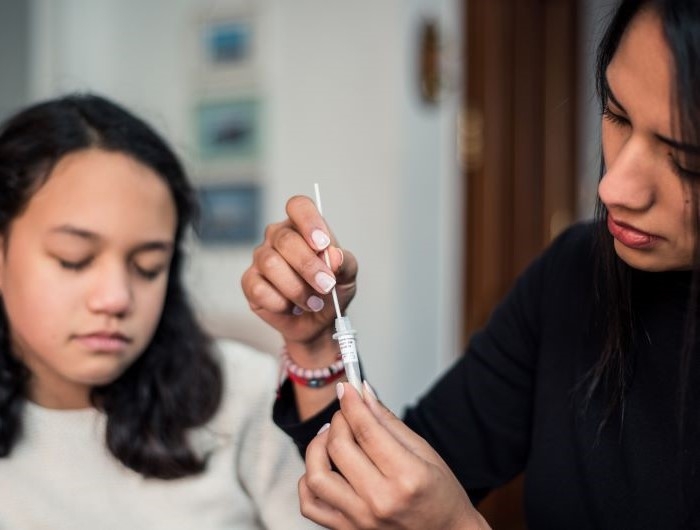Once uncommon, lab-developed tests (LDTs) are now very frequently used in the US healthcare system. If you’ve had a COVID-19 test or undergone genetic testing, the test was likely an LDT. Such tests are not currently regulated by the FDA, even as more LDTs are being introduced and marketed to Americans. Consumers relying on LDTs to make important healthcare choices need to be aware of the potentially serious problems that can result from this under-regulation. Here’s everything you need to know.
What is a laboratory-developed test?
Lab-developed tests are a type of in vitro diagnostic (IVD) tests, which test samples of blood, saliva, or tissue to monitor for and diagnose diseases and conditions. Like other IVDs, LDTs are intended to be conducted in a professional setting by licensed providers. Many IVDs are designed by one manufacturer and used by many different laboratories (e.g., a machine to measure blood counts sold to many facilities), but LDTs are different from these other IVDs because they are designed, manufactured, and analyzed by a single laboratory.
The benefits of LDTs
LDTs are the only tests currently available for certain rare diseases and conditions. With appropriate FDA oversight, they can become a more reliable tool for detecting and monitoring serious health conditions. Other LDTs test for conditions that are not themselves detrimental to consumer health, but do provide consumers with useful information (e.g., susceptibility to adverse drug reactions).
Given the high usage and demand for LDTs, consumers clearly have an interest in the results they promise to provide. With proper oversight, including FDA oversight of the riskiest products before and while they are on the market, the benefits of LDTs could be enhanced while their harms are reduced.
Lack of oversight
In 1976, the Medical Device Amendments to the Federal Food, Drug, and Cosmetic (FD&C) Act gave the FDA the authority to regulate medical devices, including IVDs (which, as noted, also includes LDTs). But in the 1970s, because LDTs were simple, few, and typically used for a very small number of people, the FDA decided not to use its authority to regulate them at that time.
Over time, however, innovations in technology allowed for significant advancements in diagnostic testing. For example, as a result of the 1990 to 2003 Human Genome Project—a large international collaboration focused on sequencing the human genome—there were significant developments in genetic testing. As a result, LDTs have become far more complex and can detect more medical conditions.
Today, manufacturing LDTs is big business—yet there is still virtually no oversight. No one knows exactly how many LDTs are on the market, and we have no comprehensive system to monitor their outcomes and accuracy.
Some LDTs are of no real value
Due to lax oversight, some LDTs are unreliable or make claims based on weak evidence, potentially resulting in wasted time and resources and even significant harm to patients. This includes tests that:
- claim to optimize health with individualized diet or supplement recommendations through testing that has not been validated;
- screen for markers of significant conditions like heart disease risk and statin therapy response, but which don’t accurately predict either; or,
- in the most egregious cases, claim to detect diseases that do not even exist.
In October 2023, CSPI sued EpicGenetics for, among other things, false claims associated with their FM/a test for fibromyalgia and their “100Sure Test.” According to the company’s own reports, EpicGenetics’s FM/a test, marketed as “99% accurate,” produces false-negative results 7 percent of the time and, for individuals with rheumatoid arthritis or lupus, produces false-positives nearly one-third of the time.
But even more disturbing is their “100Sure Test,” which, according to the lawsuit, is the same fibromyalgia test repackaged, rebranded, and marketed to be “100% accurate” in detecting a phony condition that EpicGenetics calls “Immune Deficiency Disease” (IDD). In our complaint, we explain that EpicGenetics simply created IDD to correspond with markers usually detected by the test; the condition is not recognized by medical authorities.
LDT inaccuracies
LDTs can result in both false-positive and false-negative results. If patients receive false-negative test results for serious health conditions, they may defer life-saving treatment—or fail to receive the treatment entirely. False-positive test results can cause patients to obtain unnecessary medication or surgery and upend their lives as they work to process, prepare, and cope with a disease or condition they don’t even have.
Until the FDA regulates LDTs, laboratories are only required to adhere to the Clinical Laboratory Improvement Amendments (CLIA), administered by another agency. This is not effective in ensuring the accuracy of LDTs because CLIA regulates only laboratory operations, not tests themselves. In 2015, the FDA released a case study of 20 problematic LDTs produced despite CLIA oversight. Their research concluded that without FDA oversight in place, inaccurate LDTs had caused or may have caused significant harm to patients.
How CSPI is working to ensure LDT oversight is established
In 2014, the FDA released draft guidance requiring premarket reviews by the FDA before the highest-risk LDTs could be released to the market. However, in 2017, the FDA withdrew this attempt in response to pushback from trade associations, academic medical centers, and Congress.
Several attempts have been made since then to create legislation to address this issue, including the Verifying Accurate Leading-Edge IVCT Development (VALID) Act. Introduced repeatedly in the last three years, this act proposes a uniform regulatory framework for all IVDs, including LDTs. But these bills have never passed.
On September 29, 2023, FDA released a new proposed rule in which LDTs are clearly defined as medical devices, ensuring FDA review of the riskiest devices before they can be sold to consumers. The rule establishes a four-year phase-in plan and does not allow for LDTs already on the market to be automatically granted approval simply because they were available before the rule change.
CSPI supports the FDA’s new proposed rule, but we recognize that implementing these changes would create a need for additional staffing. If the rule is finalized, CSPI will be calling on Congress to provide the FDA with adequate resources to fully execute its expanded oversight.




